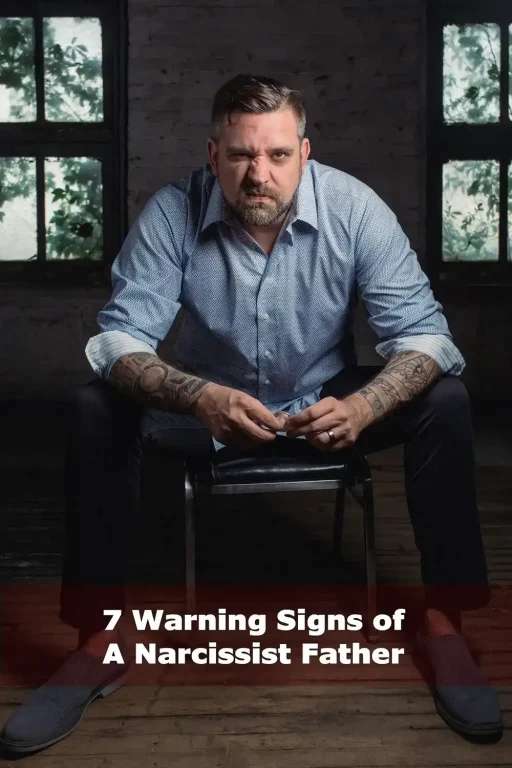Today's Saturday • 12 mins read
— By Dr. Sandip Roy.
Growing up under a narcissistic father is highly toxic. The child keeps trying hard to keep their father happy so that they don’t get physically beaten, publicly shamed, or deprived of basic needs like food and clothes.
Many disorganized and people pleasers never realize they have been victims of toxic parenting by a narcissistic father. Their father’s cruel acts scarred them from expressing their emotions for the rest of their life.
Narcissism is not just self-absorption. It becomes a dangerous personality flaw in a male parent.
These fathers feel constantly entitled, demand constant attention, and show little empathy to their kids. They treat their kids as slaves, making them do what they say.
There are at least twenty red flags of narcissism.
7 Signs of A Narcissistic Father: Toxic Parenting
While narcissistic traits can be present in mothers, too, what are some typical ways a narcissistic father behaves?
Narcissistic fathers don’t let their children heal from the trauma they cause. They build trauma bonds that may last even after the father dies.
1. He lacks empathy and is always angry.
- Narcissistic fathers cannot empathize with their kids, often dismissing their feelings and needs. This emotional neglect harms the child’s self-worth and emotional growth.

One key sign of a narcissistic father is a profound lack of empathy towards others and their own children.
Narcissistic fathers refuse to connect with their children on an emotional level. They dismiss and trivialize their kids’ emotional expressions and experiences with comments like:
- “You need to grow up; why are you always crying?”
- “Stop being so sensitive, it’s not a big deal.”
- “You’re always overreacting.”
He sees his kids as extensions of himself and raises them mainly to fulfill his demands. His needs come before those of his children at all times. He might even see his children’s needs as roadblocks in his life.
Children of narcissistic fathers often become lifelong people-pleasers. They internalize that their emotions are unworthy of attention, and grow up seeking validation from others and suppressing their own needs.
The narcissistic father is impatient, intolerant, and quick to anger. They are always simmering with a base level of anger, ready to flare up into narcissistic rage at the slightest failure of their child.
“When you give them even the mildest critique or feedback, you must be prepared for rapid, rageful, and disproportionate reactions, and it can be doubly confusing because they will frequently retaliate by criticizing you in far harsher terms.” – Ramani Durvasula
He can physically hurt his children out of frustration when they ask for something, or he has to make some sacrifices in his lifestyle to fulfill his child’s needs.
The worst part: They hit their kid and force them not to let out a sound, threatening more hurt if they cry out.
“One of the hallmarks of narcissism is altered emotion, including decreased affective resonance (e.g. empathy) with others.”
– Fan & Wonneberger, 2010
The child does not understand that their father’s lack of empathy is something they can never fix, despite all their father-pleasing and self-sacrificing behaviors.
This study found that high narcissistic subjects had higher degrees of alexithymia and lower deactivation in the insula during empathy.

2. He has a constant need for attention and validation.
- Narcissistic fathers crave constant attention, reducing their children to mere sources of praise for their own egos. This dad-focused conditioning drives the child to overvalue other people’s approval.
A narcissistic father makes everything about him. He dominates conversations, redirects focus to himself, and treats his child as a validation source rather than an individual with their own needs.
In his presence, your thoughts and feelings get pushed aside. He interrupts your stories, dismisses your achievements, and even hijacks your special moments to stay in the spotlight.
The child’s experience:
- Constantly trying to earn his approval
- Feeling unimportant and second-choice
- Learning that their worth depends on pleasing him
- Struggling to develop their own identity
The brain science: This study found that people with narcissistic traits have more gray matter in brain areas linked to self-enhancement and social dominance.
Breaking free: You deserve to be seen and valued for who you are, not as a reflection of someone else’s ego. Your worth isn’t tied to his approval.

3. He constantly uses manipulation and gaslighting.
- Narcissistic fathers use manipulation and gaslighting to control their kids, making them question their own reality. This toxic behavior erodes the child’s self-confidence and makes it hard for them to trust their own judgments.
Narcissistic fathers are master manipulators. They use guilt trips, emotional blackmail, and mind games to get their way. When things go wrong, they twist the situation to make themselves the victim and blame their children.
Common manipulation tactics:
- Rewriting history to suit their version of events
- Denying hurtful things they said or did
- Using guilt and shame as weapons
- Playing victim when confronted
Gaslighting in action: Gaslighting is a form of psychological manipulation. Your father says something cruel, then later denies it completely. When you bring it up, he calls you “too sensitive” or claims you “provoked him.” You start questioning your own memory and sanity.
The long-term damage:
- You stop trusting your own perceptions
- Decision-making becomes difficult
- Relationships suffer because you can’t trust your judgment
- You feel powerless and confused about reality
Your path forward: You have the right to trust your own experiences and emotions, even when others deny or invalidate them. Therapy can help you rebuild confidence in your perceptions and break free from these toxic patterns.
Do not take the blame for his manipulations. Stop feeling guilty because he heaped you with shame for things you did not do.
4. He’s grandiose, overshadowing his child’s achievements.
- Narcissistic fathers damage their kids’ self-worth by down-comparing their achievements and making them feel unimportant. This grandiose behavior traps the child in a cycle where they constantly seek their father’s approval, neglecting their own needs and desires.
A narcissistic father believes he’s superior to everyone, including his children. He can’t celebrate their wins without making it about himself or someone else who did “better.”
What this looks like: You bring home excellent grades, and instead of praise, you get: “That’s good, but I was always top of my class,” or “You think that’s impressive? Wait until I show you what I accomplished at your age.”
Your achievements become launching pads for his stories about his own greatness.
The entitled father:
- Demands excessive attention and special treatment
- Expects you to fulfill his every need
- Dismisses your needs in favor of his ego
- Creates an unbalanced power dynamic where he always comes first
The damage to you:
- You stop taking pride in your accomplishments
- Self-doubt becomes your constant companion
- You struggle to develop your own identity
- Asserting your needs feels impossible
Your healing path: Your achievements and desires are valid and deserving of recognition, regardless of what he taught you through his comparisons and dismissals.
Reclaim credit for your accomplishments, celebrate your uniqueness, and learn to assert your needs confidently.
5. He violates his child’s personal space and boundaries.
- Narcissistic fathers trample on their children’s personal boundaries, leading to long-term issues with autonomy and healthy relationships. This can destroy the child’s ability to form healthy give-and-take relationships and to stand up for themselves.
A narcissistic father treats boundaries like suggestions he can ignore. Your privacy, emotions, and relationships are all fair game for his control.
Physical boundary violations:
- Goes through your belongings without permission
- Reads your diary, texts, or personal messages
- Barges into your room without knocking
- Treats your personal space as his own
Relationship control:
- Isolates you from friends who might “turn you against him”
- Creates dependency by limiting outside relationships
- Restricts your social interactions and isolates you
- He badmouths people who support you
Emotional boundary violations:
- Reverses the parent-child dynamic, making you the caretaker
- Uses guilt and manipulation to control your behavior
- Expects you to manage his emotions and needs
- Exploits your feelings for his own gain
The long-term damage: You grow up confused about where you end and others begin. Setting boundaries feels impossible because you were never allowed to have them.
Learning to set boundaries: Start by identifying your own needs, values, and limits. Communicate them clearly and consistently. Expect pushback—he’ll resist losing control.
Learn to establish and maintain boundaries despite his resistance. You have the right to protect your well-being and reclaim your autonomy.
6. He emotionally neglects and abandons his child.
- Narcissistic fathers often ignore their children’s emotional needs, leaving them feeling worthless and unimportant. This can leave deep emotional scars, making it hard for the child to trust others and feel worthy of love.
A narcissistic father is so consumed with his own needs that he becomes emotionally unavailable when his child needs him most. Your feelings don’t matter to him. Only his do.
What emotional neglect looks like:
- Dismisses your emotions or calls them “silly” or “dramatic.”
- Makes his problems more important than your feelings.
- Shows indifference when you’re hurt or upset.
- Responds with anger when you seek comfort.
- Acts like your emotional needs are burdens.
The devastating impact: A narcissistic father can paint a child into a wall.
Years of having your emotions dismissed train you into thinking that your feelings don’t matter. You lose touch with your own emotional needs and forget what it feels like to be truly happy.
Long-term damage:
- Your happy childhood memories can fade from years of invalidation
- You struggle with low self-esteem and feelings of unworthiness
- You forget how to recognize your own emotional needs
- Trusting others becomes nearly impossible
- You fear being abandoned in relationships
Words hurt as deeply as physical wounds. Emotional neglect leaves invisible scars that impact your ability to connect with others and regulate your emotions.
Your healing journey: You are deserving of love, care, and support. It may take time to reconnect with your emotions and learn to trust again, but healing is possible.
Seek therapy. It can provide you with a safe space to process your neglected emotions, rebuild self-worth, and learn to form secure, healthy relationships.
7. He ensnares his children with parentification and enmeshment.
- Narcissistic fathers often force their kids to behave like parents, making them handle the emotions and responsibilities of adults. They also hold them in enmeshment, blurring the lines between their own needs and their child’s, stifling the child’s emotional growth.
Parentification and enmeshment are two interconnected signs of a narcissistic parent, more common in narcissistic mothers than fathers.
Parentification = when you become the parent:
- You’re expected to comfort him when he’s upset
- He shares age-inappropriate problems with you
- You mediate family disputes and keep the peace
- His emotional well-being becomes your responsibility
- You learn to manage complicated emotions or face his anger
Parentification steals your childhood.
A narcissistic father flips the parent-child relationship upside down. Instead of caring for the child, he expects them to manage his emotions and needs.
The child’s playful years disappear. They become an adult person in a child’s body, forgetting their own needs and desires.
Enmeshment = when boundaries disappear:
- He intrudes on your personal space and privacy
- Your thoughts and feelings get tangled up with his
- You can’t tell where you end and he begins
- He involves you in disputes and decisions
- Your autonomy never develops properly
Enmeshment blurs the boundaries between the parent and child, resulting in an unhealthy and overly dependent relationship. The child doesn’t develop a healthy sense of autonomy, and their thoughts, feelings, and ideas get interwoven with their father’s.
Lasting damage:
- You can’t set or maintain healthy boundaries
- You gravitate toward codependent relationships
- You carry the weight of others’ emotions through life
- Prioritizing your own well-being feels selfish or wrong
- You don’t know who you are apart from taking care of others
Your path to freedom: Remind yourself that you are not always responsible for your father’s emotional well-being. Learn to prioritize self-care; it is a necessary part of your thriving.
Therapy can help you untangle these toxic dynamics, discover your own needs and desires, and develop healthy relationship patterns.
How To Heal From A Narcissistic Father’s Abuse
My advice for those who grew up around a narcissistic father figure: Stop people-pleasing.
If you constantly seek validation for your choices and views, stop. Recognize the emotional baggage that makes you do so. Unless you heal from it, you may become a generational co-narcissist. Your healing protects not just you, but future generations.
Your Healing Steps
- Recognize the Reality: Your need for constant validation, irritability, and unhappiness are a result of conditioning. He shaped you to serve him. See this.
- Challenge Your Self-View: He distorted how you see yourself. Get a realistic self-assessment to view yourself outside your father’s warped mirror.
- Set Boundaries: Protect yourself emotionally, physically, and financially, even when it feels scary. You owe this to your mental health.
- Prioritize Self-Care: Self-care isn’t selfish; it’s survival. Take that trip, start therapy, treat yourself with the kindness you’d show a good friend.
- Reclaim Your Worth: Set personal goals, celebrate small wins, and surround yourself with people who see your true value.
- Build Your Support Network: Seek help from trusted friends, family, or therapists who can help you see that your self-worth doesn’t depend on others’ opinions.
- Get Professional Help: Consider CBT or DBT therapy to untangle these deep-rooted patterns.
- Your Future: As you heal, you’ll build capacity for meaningful relationships where you’re valued for who you are, not what you provide.
Related Book: Trapped in the Mirror: Children of Narcissists by Dr. Elan Golomb.
Final Words
5 typical behaviors of a narcissistic father:
- Narcissistic Rage: Unpredictable fits of rage to devalue and insult you to maintain control over you.
- Two-Faced Charm: Charismatic in public but grumpy and angry at home (Jekyll-and-Hyde behavior).
- Mental Manipulation: Teaches you to value his opinions over your own through mind games and gaslighting, to keep you trapped with him.
- Creating Dependency: He “dog-trains” you to put his needs first, making you fear acting without his permission while grooming you to be his future caregiver.
- Impossible Standards: His unrealistically high expectations keep you in permanent people-pleaser mode, chasing validation even after he’s gone.
√ Also Read: Surviving Toxic Love: 4 Stages of A Narcissistic Relationship
√ Please spread the word if you found this helpful.
» You deserve happiness! Choosing therapy could be your best decision.
...
• Disclosure: Buying via our links earns us a small commission.